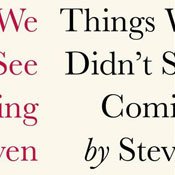When I think of a future dystopian society accompanied by a series of natural disasters, movies like "Waterworld" and "Mad Max Beyond the Thunderdome" are regrettably the first stories that come to mind. Fortunately for readers of Steven Amsterdam's "Things We Didn't See Coming" (Pantheon, February 2010, $24), the author provides a more believable glimpse of how humankind might survive a nation-crippling, apocalyptic chain of events.
The novel's nameless narrator tells of nine connected stories, beginning with New Year's Eve, Dec. 31, 1999, spent with his parents and grandparents. Parents, "Dad" and "Cate," offer conflicting opinions on Y2K; his father stocks up on supplies and touts the end of the world, while his mother remains skeptical.
"Things We Didn't See Coming" presents a nation torn apart by natural disasters, a failed government and the weaknesses of its citizens in uncertain times, while Amsterdam's narrator exemplifies a sort of invulnerability throughout it all by simply surviving.
Readers will find references to a mandatory government decision for all citizens to either move in or out of the cities with "blockades" designed to keep people in their respective locale. The narrator and his grandparents manage to escape the pestilential prison of the city, thanks to his grandmother's quick talking at one of the blockades.
In Amsterdam's future, suburbs are lifeless shells; as the narrator and his grandparents drive out of the city, suburbia exists as more of a demilitarized war zone than Pleasantville.
"The last time I left the city was four years ago, and the beltway looks just as grim as I remember. No one's living here, because everybody had to choose, urban or rural, and this place is neither. Dry, decaying suburbs."
Amsterdam's living spaces create a distortion in social classes. He devours social boundaries and then regurgitates them, often to darkly hilarious ends. The dichotomy in this future between rural and urban societies fuels resentments revealed as the narrator moves past the bygone suburbs into the agricultural outer territories. Here, a truck full of rural kids sees the narrator's little car, and proceeds to attack the protagonists.
"They catch up in two seconds and start bombarding us with apples. Grandpa stays steady through the pounding. We roll up the windows to protect ourselves. Sad, because we haven't seen apples in a year and now they're drumming all over us. Unthinkable that people could keep apples from other people."
The contrast of the city dwellers' lives to the country dwellers' is palpable here, but Amsterdam's description of landscapes illustrates the societal schism in an intriguing manner.
"Then the farmland starts on either side and it's like in ‘The Wizard of Oz' when Dorothy crosses into Technicolor. Tobacco, lush and irrigated to the greenest green. They'd let us die of thirst inside the city, but they keep this tobacco so bright it practically hurts your eyes."
Throughout the nine stories, the volatility of weather is prominent. In one chapter, the rain never ceases, while in another the rain is a bygone memory. Amsterdam's description of the weather mirrors the narrator's relationships: sometimes eerily calm, sometimes precariously stormy.
The narrator's affections are most often aimed at Margo, a woman with whom he survives in the wilderness trying to escape a rampant disease plaguing the country. Margo and the narrator part ways at least once in the novel, only to reunite.
Margo and the narrator start a life with Juliet, a powerful politician who was born into wealth and is now a champion of peace and prosperity. The relationship is both professional and romantic, as they are Juliet's political aides and her lovers. It's here that Amsterdam deeply explores the concept of relationships.
"The reason Juliet chose us, it turned out, is we're heterosexuals. Voters are fine about ignoring her personal life, to a point. Since the various media outlets force them to read endlessly about her night crawls ... they want variety of gender."
Amsterdam uses the threesome to explore the differing relationships in a way not gratuitous, but rather profound and compelling. Juliet entertains populist, idealistic political philosophies, which depart notably from her elitist, opulent lifestyle. Amsterdam doesn't compare these differences directly, simply implies them, which proves much more effective than, perhaps, blatantly stating the obvious.
The author's insights into government and the capacities of humans in government positions is a recurring theme; whether it's through Juliet and the relationships with Margo and the narrator, or through one of the narrator's sundry government positions (admittedly, one of the funnier chapters is where he holds a non-government position as an adventure guide for the terminally ill).
As the narrative progresses, the narrator holds miscellaneous positions with the recovering government.
"Things We Didn't See Coming" is humorous at times, but stays imaginative and penetrative to the human condition throughout. Although short, the novel does not suffer from its brevity; it is a fleeting, yet exquisite, romp through a devastated world.


